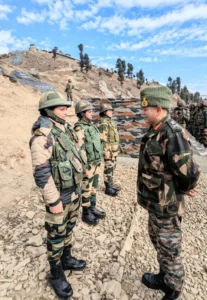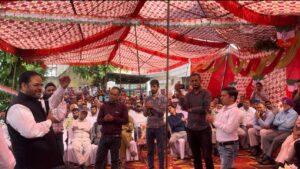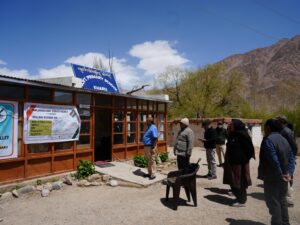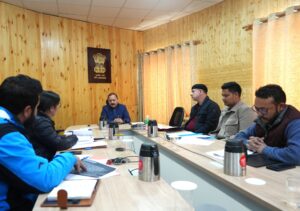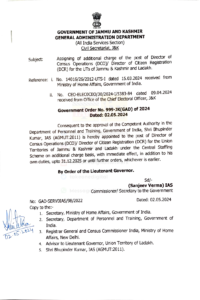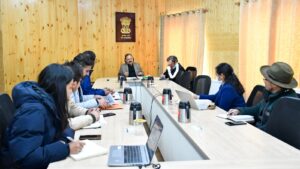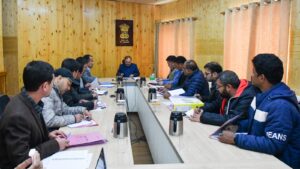Give solutions to stop youth from falling prey to extremist groups, Y20 delegates urged
Leh, Apr 27 (PTI) Foreign delegates at the Y20 Pre-summit here have been urged to give “substantive recommendations” on stopping youth from falling into the trap of extremist groups and also find a solution to “disturbing aspects of youth health”, especially in countries ravaged by wars and “pandemic trauma”.
The three-day Y20 Pre-summit in scenic Leh is attracting global attention as more than 100 young delegates from 30 countries have gathered here to find solutions to some of the most vexing issues confronting the world, including climate change, health in post-Covid era and the crises arising from the political and territorial instability in several parts of the world.
https://www.upsc.gov.in/FR-CSM-22-engl-230523.pdf
With India getting the G20 presidency — an intergovernmental forum comprising 19 countries and the EU, which works to address major issues related to global economy — this year, the onus is on the country to find solutions to some of the most challenging issues facing the world.
The Y20 (Youth20) is a forum within the G20, which gives inputs and suggestions on several issues being faced by the world.
In his address to the delegates before they entered the “deliberation” and “negotiation” phase on Thursday, senior bureaucrat and joint secretary, G20, Nagaraj N Kakanur said that extremist groups exploit the frustration and anger of the youth, and that the delegates gathered here should find ways to ensure they do not get excluded from the mainstream and become easy preys of terror groups.
“Young people continue to face significant challenges stemming from globalisation, violence, demographic shifts, inequality-forced displacements, shrinking civil space, changing labour market and climate change,” said Nagaraj.
“This situation is fuelling a decline in confidence in political establishments and institutions and is keenly felt by the young people in two ways: first is the participation gap, a result of which young people find themselves out of the decision-making process and, second, the opportunity gap, which is manifested by steeply-rising youth unemployment.
“The marginalisation of young people foments political distrust and hopelessness and challenges the systems and structures and adds to national, regional and global insecurity.
https://www.upsc.gov.in/FR-CSM-22-engl-230523.pdf
“When such a cycle takes hold, it is all too easy for certain extremist groups to exploit the frustration and anger of the youth that stems from exclusion. To create a peaceful, sustainable and prosperous world, young people need to be involved.
“I hope, your (Y20 delegates) deliberations here on peace building will make progress and the Y20 (will) put forward substantive recommendations in this regard,” hoped Nagaraj.
Secretary, Youth Affairs and Sports, Meeta Rajivlochan, said that the Covid-19 pandemic had brought forth the pressing need to come together and “collaborate” as this is the only way to fight global crises in future.
“The Covid pandemic has brought home the point to come together on such multilateral platforms (such as Y20) and find ways to collaborate with each other and to share knowledge.
An ever-expanding pool of knowledge is so very important to fight future crises. Knowledge shared is knowledge multiplied. It’s upon you to devise ways to set up robust knowledge-sharing systems,” she said.
Nagaraj also shed light on how the youth, despite being a “relatively healthy” section of the population, was often at risk of malnutrition, infectious diseases and drug abuse, which was causing them “unintentional injury”, and urged the delegates to come up with solutions to improve their wellbeing.
“Youth is a relatively healthy segment of the population; their health needs have generally been overlooked. Youth is a challenging time of life. Poor health is often caused by the lack of a safe, vibrant and benign environment.
“Malnutrition, the risk of infectious diseases, narcotic and psychotropic drug abuse and unwarranted risk-taking and destructive activity (is) resulting in unintentional injury.
“Anxiety, depression, stress and suicide present disturbing aspect of youth health especially prevalent in countries that are ravaged by war or other pandemic trauma, and a lack of social support and services may seriously affect young people and cause lasting harm to their physical and mental health,” opined Nagaraj.
https://www.upsc.gov.in/FR-CSM-22-engl-230523.pdf
“Encouraging the full participation of youth in the development and promotion of health-related programmes and policies will enable them to become agents of change and positively affect their lives and those of their peers.
“I hope the Y20 deliberations on the issue of (their) health, wellbeing and sports will be extremely productive,” he added.
Nagaraj asserted that under India’s G20 presidency “deliberations on several global issues had already started taking shape” and that the Y20 had identified the future of work climate, changing teams building environment, health, wellbeing and sports as some of its broader priorities of discussion.
“India is steering multiple discussions on vital global issues during its G20 presidency. Deliberations on global issues have already started taking shape within the G20, especially on matters of interest to a young audience, like yours (delegates) through the Y20 engagement programme.
“The mobilisation of youth around the world on the issue of climate through the massive power they possess to hold decision making is unprecedented.
“The youth are valuable contributors to climate action; they are the agents of change… you are entrepreneurs and innovators whether through education, science or technology or through activism.
“Young people are scaling (up) their efforts and using their skills to accelerate climate action. The collective agency of youth is recognised as one of the most significant resources to achieve the 2030 sustainable development goals including combating climate action and its impact,” he asserted.
Army will ensure safety of nation: Ladakh LG
============================
The Lieutenant Governor of Ladakh BD Mishra said on Thursday that the Indian Army will continue to protect the borders of the country.
https://www.upsc.gov.in/FR-CSM-22-engl-230523.pdf
“The Indian Army in Ladakh ensures the safety and security of the nation. They also very effectively protect India’s territorial integrity, besides also engaging in several peoples’ initiatives such as Sadbhavna Missions.
“They promote development and trust building among the locals, which includes infrastructure, healthcare, education, professional training of youth and promoting the region’s growth.
“I salute the Indian Army for their courage, commitment and spirit to sacrifice in protecting the sovereignty of India,” he added.

